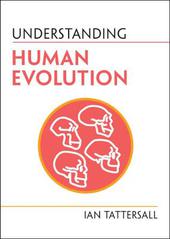
|
Understanding Human Evolution
Paperback / softback
Main Details
| Title |
Understanding Human Evolution
|
| Authors and Contributors |
By (author) Ian Tattersall
|
| Series | Understanding Life |
|---|
| Physical Properties |
| Format:Paperback / softback | | Pages:208 | | Dimensions(mm): Height 178,Width 128 |
|
| Category/Genre | Philosophy of science
Popular science
Genetics (non-medical)
Palaeontology |
|---|
| ISBN/Barcode |
9781009101998
|
| Classifications | Dewey:599.938 |
|---|
| Audience | |
|---|
| Illustrations |
Worked examples or Exercises
|
|
Publishing Details |
| Publisher |
Cambridge University Press
|
| Imprint |
Cambridge University Press
|
| Publication Date |
28 July 2022 |
| Publication Country |
United Kingdom
|
Description
Human life, and how we came to be, is one of the greatest scientific and philosophical questions of our time. This compact and accessible book presents a modern view of human evolution. Written by a leading authority, it lucidly and engagingly explains not only the evolutionary process, but the technologies currently used to unravel the evolutionary past and emergence of Homo sapiens. By separating the history of palaeoanthropology from current interpretation of the human fossil record, it lays numerous misconceptions to rest, and demonstrates that human evolution has been far from the linear struggle from primitiveness to perfection that we've been led to believe. It also presents a coherent scenario for how Homo sapiens contrived to cross a formidable cognitive barrier to become an extraordinary and unprecedented thinking creature. Elegantly illustrated, Understanding Human Evolution is for anyone interested in the complex and tangled story of how we came to be.
Author Biography
Ian Tattersall is Curator Emeritus in the Division of Anthropology of the American Museum of Natural History, New York, USA. With around 400 papers and 30 books published in primatology and evolutionary biology, he has received prizes from organisations ranging from the American Association of Physical Anthropologists to the Accademia Lincei of Rome and the Monuments Conservancy. He has conducted fieldwork in countries as diverse as Madagascar, Yemen, Vietnam and Mauritius.
Reviews'For years, Ian Tattersall has been the go-to source for the latest facts and interpretations of human evolution. Here, in his clear, pithy style, he brings us up to date on the latest discoveries, weaving them skillfully into a coherent outline of hominid history extending back millions of years. It's all here-from the latest on DNA and radiometric dating of fossils, to the nature and origin of the still-mysterious self-consciousness that is unique to modern humans. A terrific resource and wonderful read!' Niles Eldredge, Curator Emeritus in the Division of Paleontology, American Museum of Natural History, USA 'Ian Tattersall provides in this short and engaging book the story of how humans evolved, and, as importantly, how we have come to learn about our evolutionary history and the nature of being human through great discoveries and great scientific debates.' Robert Foley, Leverhulme Professor of Human Evolution, University of Cambridge, UK 'Understanding Human Evolution provides a sweeping overview of the field of human evolution, giving equal attention to the history of the discipline as well as current thoughts and ideas about our attainment of the milestones of human evolution-upright posture and bipedal locomotion, the evolution of tool use, the expansion of the brain and human cognition, the development of language, and the spread of humans out of Africa around the globe. All of this is presented in a concise and accessible package by one of the most well-known popularizers of the field today. This is an excellent resource for anyone looking for an introduction to the fossil evidence for human evolution, as well as those who want to catch up on the current state of knowledge in this fast-moving discipline.' Leslie C. Aiello, FBA, Professor Emerita, University College London, UK 'An enjoyable, highly informative, and scholarly read. Tattersall is at his best here. Engaging the reader with his inimitable style, he interprets and explains the convoluted evidence for how we became human. Written largely for the non-specialist, there is much here that will inform and even stimulate professional paleoanthropologists.' Donald Johanson, Founding Director of the Institute of Human Origins at Arizona State University, USA
|